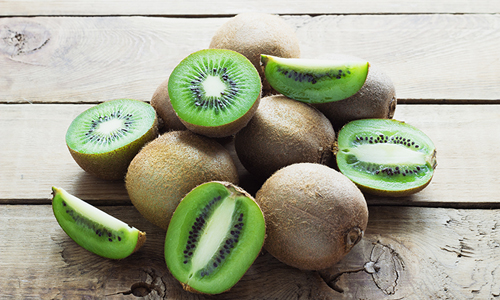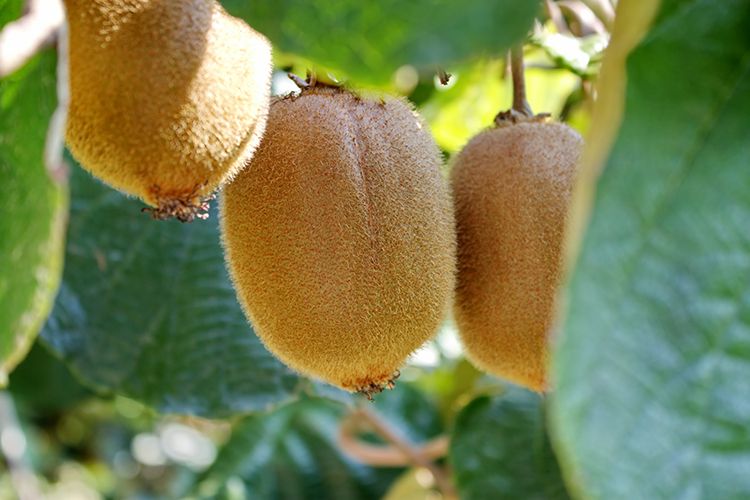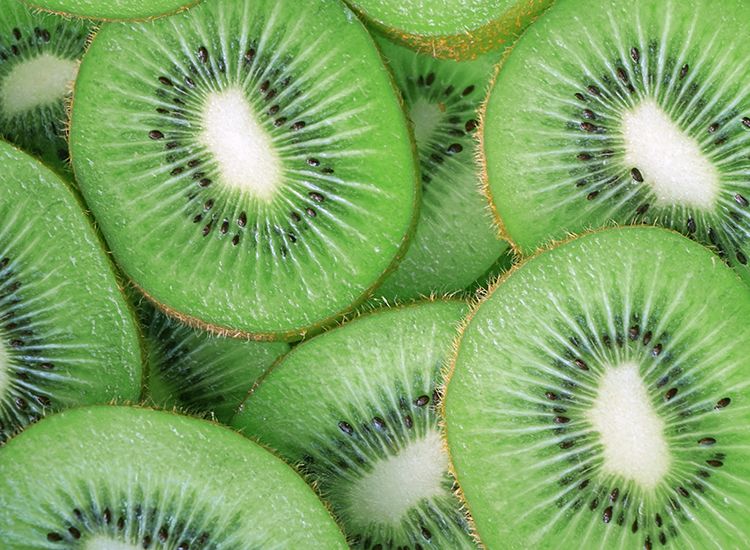

Read page 1
9. Suitable for Diabetics
Kiwi is in the “low” category for glycemic index, meaning it does not raise your blood sugar quickly. It has a glycemic load of 4 which means it is safe for diabetics.
10. Protects Against Macular Degeneration and Other Eye Problems
Macular degeneration is the leading cause of vision loss in older adults. A study on more than 110,000 men and women showed that eating three or more serving of fruit per day decreased macular degeneration by 36 percent. This is thought to be associated with the kiwi’s high levels of lutein and zeaxanthin—both of which are natural chemicals found in the human eye. Although both fruits and vegetables were studied, this same effect was not shown for vegetables.
11. Create Alkaline Balance
Kiwi is in the “most alkaline” category for fruits, meaning it has a rich supply of minerals to replace the excess of acidic foods most individuals consume. A few of the benefits of a properly acid/alkaline balanced body are: youthful skin, deeper sleep, abundant physical energy, fewer colds, less arthritis and reduced osteoporosis.
12. Great for the Skin
Kiwis are a good source of vitamin E, an antioxidant known to protect skin from degeneration.
13. Exotic Taste and Look for Food Variety
Kiwis look and taste great. Kids often love them because they are so different from most fruits.
For nutritional balance it is always good to eat a variety of foods. Each food has its own unique qualities and powers. The trouble with most people’s diet is that we eat such a limited number of foods. It increases our chances of not getting enough of important nutrients.
14. Naturally Organic
Kiwi fruit is on the list of foods that are generally safe from a lot of pesticide residues. For 2016 it came in with the top 10 safest foods. While it is always good to support organic when you can as a matter of principle, it’s also good to know whether there is a big danger if organic is not available or viable for you.

Interesting Facts About Kiwifruit
- Kiwi fruit was named after the New Zealand Kiwi bird—an unusual flightless bird—because they are both small, brown and furry.
- Not all kiwi fruit is fuzzy! The most popular species of kiwifruit is appropriately called fuzzy kiwifruit, but there is also golden kiwi with a smooth bronze skin. The golden kiwi is actually sweeter and more aromatic in flavor
- Although kiwis have been native to China for centuries, practically no one in North America knew what they were 60 years ago. They were first introduced to the U.S. in 1962. They caught on fast!
- Although kiwifruit can grow in any temperate climate, most of the world’s kiwi are grown in Italy, New Zealand and Chile.
- Yes, you can eat the fuzz if you want.
How to Use:
- If a kiwi does not yield a bit to finger pressure, it can be ripened by storing it at room temperature away from the sun.
- This ripening can be hastened by putting it in a paper bag with a banana, apple or pear.
- Once a kiwi fruit is ripe, keep away from other fruit (even in the refrigerator) since the kiwi is very sensitive to the ethylene gas given off by those other fruits and it will over ripen.
- The actinidain in raw kiwi makes them unsuitable for desserts and other dishes that are not eaten right away because it can make the dish too mushy or stop it from setting. This applies to proteins but also to other fruits.
Cautions:
Kiwifruit contain a measurable amount of oxalates, a naturally occurring substance in many plants and animals. When oxalates become too concentrated in body fluids, they can crystallize and cause health problems. People with kidney or gallbladder problems may therefore want to avoid eating kiwi. There is a lot of controversy about the amounts needed to be significant, particularly from plants.

Kiwis also contain enzyme substances associated with the latex-fruit allergy syndrome. If you have a latex allergy, you may be allergic to kiwi also. Since ripening the fruit with ethylene gas increases these substances, organic kiwi not treated with gas will have fewer allergy-causing compounds. Cooking also deactivates the enzymes.
YOU MIGHT ALSO LIKE
Health Benefits of Drinking Lemon Water
Is Coconut Oil Healthy to Eat?

 233k
233k  41k
41k  Subscribe
Subscribe 